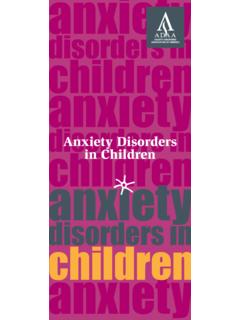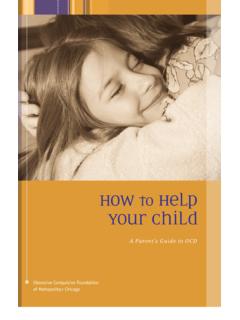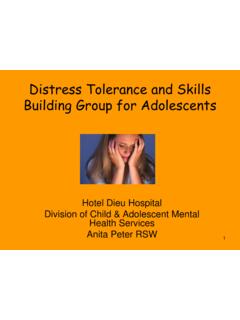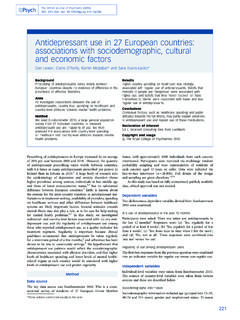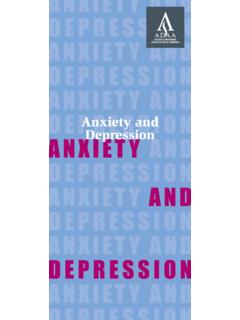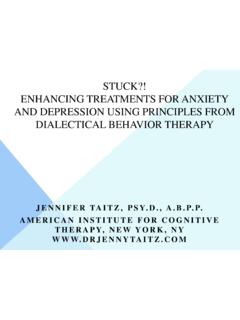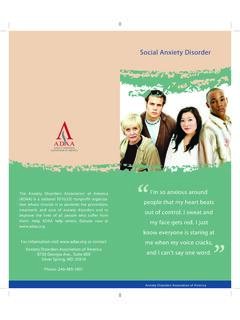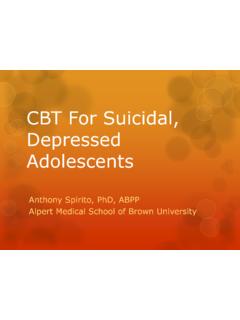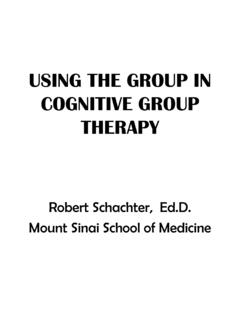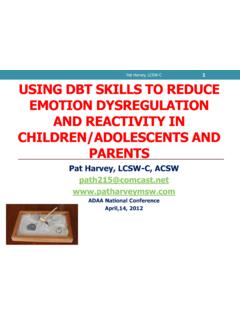Transcription of Depression - ADAA
1 Depression Depression Depression . Depress Depression . M. ost people feel depressed at times. Losing a loved one, getting fired from a job, going through a divorce, and other difficult situations can lead a person to feel sad, lonely, scared, nervous, or anxious. Depression is more than just sadness. It interferes with daily A major depressive episode may include these symptoms: life and causes pain for you and everyone who cares about you. It's a common illness, but a very serious one. Persistent sad mood, most of the day, nearly every day Loss of interest or pleasure in hobbies and activities, The term Depression often characterizes feelings of being including sex sad, discouraged, hopeless, irritable, unmotivated, as well as a general lack of interest or pleasure in life.
2 When these Feelings of guilt, worthlessness, helplessness feelings last for a short period of time, it may be called a Decreased energy, fatigue, feeling slowed down . passing case of the blues. But it's likely to be a depressive Difficulty concentrating, remembering, making disorder when they last for more than two weeks and decisions interfere with regular daily activities. Insomnia, early-morning awakening, or excessive Depressive disorders, also known as mood disorders, sleeping include three main types: major Depression , persistent Low appetite and weight loss or overeating and weight depressive disorder, and bipolar disorder.
3 Depressive gain disorders can affect people of any age, including children , Thoughts of death or suicide, suicide attempts teenagers, adults, and older adults. Restlessness or irritability Types of Depression Persistent depressive disorder, or PDD, is a form of Major Depression involves at least five of the symptoms Depression that usually continues for at least two years. listed below for a two-week period. Such an episode is Although it is less severe than major Depression , it involves disabling and will interfere with the ability to work, study, the same symptoms; sad mood combined with low energy, eat, and sleep.
4 Major depressive episodes may occur once poor appetite or overeating, and insomnia or oversleeping. or twice in a lifetime, or they may recur frequently. They It can show up as stress, irritability, and mild anhedonia, may also take place spontaneously, during or after the which is the inability to derive pleasure from most activities. death of a loved one, a romantic breakup, a medical illness, Bipolar disorder, once called manic Depression , is or other life event. Some people with major Depression may characterized by moods that shift from severe highs (mania). feel that life is not worth living and some will attempt to end or mild highs (hypomania) to severe lows ( Depression ).
5 Their lives. The mood episodes associated with the disorder persist from days to weeks or longer and may be dramatic. Severe changes in behavior go along with mood changes. Major Depression Persistent depressive disorder 2. Bipolar disorder 3. These periods of highs and lows can be distinct episodes Poor judgment recurring over time. Or they may occur together in a mixed Spending sprees state: symptoms of mania and Depression experienced together. Symptoms often include agitation, trouble A lasting period of behavior that is different from usual sleeping, significant change in appetite, psychosis, and Increased sexual drive suicidal thinking.
6 A person may have a very sad hopeless Abuse of drugs, particularly cocaine, alcohol, and mood even while feeling extremely energized. sleeping medications Mood swings from manic to depressive are often gradual, Provocative, intrusive, or aggressive behavior although they can also take place abruptly. Often people Denial that anything is wrong with bipolar disorder experience periods of normal mood in between mood episodes. During the depressive phase, a person experiences the symptoms of major Depression . A depressive episode is During the manic phase, a person may experience diagnosed if five or more primary depressive symptoms last abnormal or excessive elation, irritability, a decreased need most of the day, nearly every day, for a period of two weeks for sleep, grandiose notions, increased talkativeness, racing or longer.
7 Thoughts, increased sexual desire, markedly increased energy, poor judgment, and inappropriate social behavior. Signs and symptoms of a depressive episode can include the following: A manic episode is diagnosed if an elevated mood occurs with three or more primary symptoms present most of the Lasting sad or empty mood day, nearly every day, for at least one week. With an irritable Feelings of hopelessness or pessimism mood, four additional symptoms must be present for a diagnosis. Feelings of guilt, worthlessness, or helplessness Loss of interest or pleasure in activities once enjoyed, Signs and symptoms of a manic episode can include the including sex following: Decreased energy, a feeling of fatigue or of being Increased energy, activity, and restlessness slowed down.
8 Excessively high, overly good, euphoric mood Difficulty concentrating, remembering, making decisions Extreme irritability Restlessness or irritability Racing thoughts and talking very fast, jumping from one idea to another Sleeping too much, or having trouble sleeping Distractibility, inability to concentrate well Change in appetite or unintended weight loss or gain Little sleep needed Thoughts of death or suicide Unrealistic beliefs in one's abilities and powers Suicide attempts manic increased energy depressive restlessness thoughts of death grandiose notions spending sprees mood swings pessimism 4.
9 Euphoria 5. Depression and Depression in children , Anxiety Disorders Adolescents, and Teens D I. epression and anxiety disorders are not the same, t may be difficult to tell if a child, adolescent, or teen but people with Depression often experience is suffering from Depression . Risk factors include nervousness, irritability, and problems sleeping being under stress; experiencing loss; or having and concentrating, and other symptoms similar to attention, learning, or conduct disorders. In addition, an anxiety disorder. It is not uncommon for someone girls are more likely than boys to develop Depression , with an anxiety disorder to suffer from Depression and and younger children who develop Depression are vice versa.
10 Nearly one-half of those diagnosed with likely to have a family history of the illness. Depression are also diagnosed with an anxiety disorder. Ruling out physical symptoms, a pediatrician may suggest a psychiatric evaluation. It is not uncommon for children , The term anxiety disorder includes generalized even very young children , to be diagnosed with Depression . anxiety disorder (GAD), panic disorder and panic During adolescence, with its many personal and social attacks, agoraphobia, social anxiety disorder, changes, Depression can take hold. Persistent unhappiness selective mutism, separation anxiety, and specific or moodiness is not normal.
